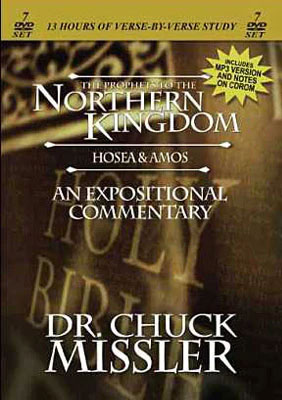Hosea, a contemporary of Isaiah (for most of his ministry) and Amos (in his earlier years) was the “Jeremiah” of the Northern Kingdom. His main target was the Northern Kingdom, yet his message was for the people of God.
When Solomon died, Jeroboam rebelled and plunged the Northern Kingdom into a prosperous but idolatrous separation. After two centuries of abandoning their heritage, God sent Hosea to present His indictment and declare that He would use their enemies as His judgment. Thomas Jefferson recognized a parallel in America when he declared, “I tremble for my country when I recall that God is just; and that His justice will not sleep forever.”
This book includes insights into God’s unique relationship with Israel, a time when they would not “be His people,” and the purpose of the Great Tribulation. Many rank Hosea’s intense self-disclosure as one of the greatest in the Bible. Among the most surprising of prophetic insights are his prerequisites for the Second Coming of Jesus Christ.
No other messenger gives so complete an outline of the ways of God with His earthly people as does Hosea: 1) God suffers when His people are unfaithful to Him; 2) God cannot condone sin; 3) God will never cease to love His own, and, consequently; 4) He seeks to win back those who have forsaken Him.
Hosea’s Message
Hosea’s message (like those of his 8th century B.C. contemporaries) must be understood against the instruction of Deuteronomy 28, the covenant between YHWH and Israel: Israel was to maintain loyalty to the Lord by worshiping Him alone and obeying His commandments; obedience would bring blessing (Deut 28:1-14) and disobedience would bring judgment and eventual exile (Deut 28:15-68).
Hosea emphasized idolatry, and compared Israel’s relationship as spiritual adultery, using his own marriage to an unfaithful woman as an illustration. Hosea’s own reconciliation also illustrates Israel’s ultimate restoration. Other sins mentioned include: social injustice (Hos 12:7); violent crime (Hos 4:2; 6:9; 12:1); religious hypocrisy (Hos 6:6); political rebellion (Hos 7:3-7); foreign alliances (Hos 7:11; 8:9); selfish arrogance (Hos 13:6); and, spiritual ingratitude (Hos 7:15). Does any of this sound familiar?
In addition to exposing the nation’s breach of covenant and God’s intention to implement judgment, Hosea also confirmed the Deuteronomic promise of ultimate restoration (Deut 30:1-10).
An Incomplete Assessment
However, Hosea’s preaching was a failure! His contemporaries did not walk in the paths of righteousness but rather stumbled into captivity. Yet, God declares, “My Word will not return void” (Isa 55:11). How can this be? Where will the fruit from Hosea’s words come? From you! His words are for you and me. We need to be the fruit bearers...
“It Could Never Happen Here”
That was the cry in Eastern Europe, doubting that Communism would ever take over. That is the presumption that pervades our own country regarding God’s judgment. It is the slogan of a fool in ignorance of God’s nature and His commitments. We, too, live in a declining culture, and God’s judgment appears overdue. He, again, may use our enemies as His mechanism of judgment. Our only hope is national repentance.
The major themes of Hosea’s message are sin, judgment, and salvation. His style is abrupt, sententious, and ungrounded; the connecting particles are few; there are changes of person and anomalies of gender, number, and construction. A worthy study, indeed!







